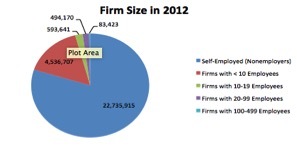You most likely have used Uber to get you where you want, or NoWait to snag a reservation at a hot, new restaurant, or bought gifts through the online marketplace Etsy. These services, and many more like it, are part of a growing and on-demand business demographic called the "freelance economy." From sharing rides to purchasing items online and even providing accommodation on sites such as AirBnB, individuals can set up their own small business and operate from their driver's seat or couch.
Much like the traditional accountant or consultant, they express qualities of not being an employee of any other entity, control their own destiny and decide for themselves when, where, how long, how often and for how much they work.
In a recent poll by SherpaShare, 63 percent of on-demand entrepreneurs indicated that they considered themselves independent contractors. There has been much debate over the classification or worker status of these new entrepreneurs, and this survey helps guide us in what those in this new business demographic believe.

Source: Graph created by NASE
These "freelance economy" entrepreneurs also find themselves members of a much larger, small business demographic: the self-employed. As self-employed Americans, they are part of a small business community of nearly 27 million non-employer and micro-businesses* who, together, generate over a billion dollars annually according to the U.S. Census.
The self-employed demographic has seen incredible growth over the last few years. In 2011, self-employed businesses grew by 55,165 new businesses and 25,657 new micro-businesses (classified as those business with nine or less employees). In the last decade, self-employed businesses has sustained an average growth rate of 2.86 percent, more than any other small business demographic.
In this new economy, anyone can operate his or her own small business by becoming an independent contractor with a larger, umbrella corporate business operation like Uber, NoWait, Etsy, or AirBnB. But with any new business venture, come a host of new opportunities, rights and responsibilities. These include wage and hour laws, tax obligations, liabilities for accidents, and pension and nondiscrimination rules. For instance, these entrepreneurs may receive paychecks without any federal and/or state government tax withholdings that require them to pay quarterly taxes on their earnings. Despite being self-employed, they may still be required to pay a host of taxes, including income, self-employment, Social Security and potentially Medicare tax.
As the "freelance economy" continues to expand, it could benefit from a political environment that is not only regulating it, but also is supportive by giving these small businesses the tools and resources they need to succeed, expand and grow. Policymakers are starting to take notice not only on the regulatory front, but also through fairer and simpler tax reform efforts to make it easier for the independent contractor. In an op-ed in Roll Call last year, our message to Congress was that we need a comprehensive approach to tax reform with the following aims in mind:
- - Amending the definition of "employee" to include an owner of a sole proprietorship to take advantage of additional benefits;
- - Simplifying the definition of a independent contractor to clarify a workers' status;
- - And streamlining the deduction process, such as creating a standard schedule C-Z by expanding as many deductions as possible for business expenses.
I am happy to report that Congress is making progress on clarifying the relationship between business owner and independent contractor. U.S. Rep. Erik Paulsen (R-MN) has recently re-introduced legislation that creates a two-part test that establishes a formal definition of who is an independent contractor. The two criteria to determine status would be: "the individual either has investment in equipment or is subject to income fluctuation" and "the individual has control of time worked and performance of services."
The recent ruling by the California Labor Commission last week that on-demand entrepreneurs are in fact employees and not independent contracts only further underscores the need for across-the-board clarification of the rules governing this growing business demographic. American ingenuity and entrepreneurship is an incredibly important part of our country's economic growth. As this new "freelance economy" continues to expand, it's imperative that lawmakers foster a supportive environment that creates stability and fairness in the rules governing these on-demand entrepreneurs, who are quickly becoming a valuable part of the largest, small business community.